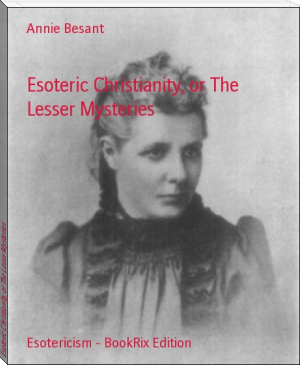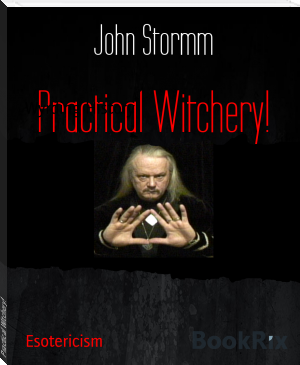Esoteric Christianity, or The Lesser Mysteries - Annie Besant (ebook reader that looks like a book .TXT) 📗

- Author: Annie Besant
Book online «Esoteric Christianity, or The Lesser Mysteries - Annie Besant (ebook reader that looks like a book .TXT) 📗». Author Annie Besant
certain truths are exoteric and others esoteric. Some of the hearers of Pythagoras were content with his _ipse dixit_; while others were taught in secret those doctrines which were not deemed fit to be communicated to profane and insufficiently prepared ears. Moreover, all the Mysteries that are celebrated everywhere throughout Greece and barbarous countries, although held in secret, have no discredit thrown upon them, so that it is in vain he endeavours to calumniate the secret doctrines of Christianity, seeing that he does not correctly understand its nature."[125]
It is impossible to deny that, in this important passage, Origen distinctly places the Christian Mysteries in the same category as those of the Pagan world, and claims that what is not regarded as a discredit to other religions should not form a subject of attack when found in Christianity.
Still writing against Celsus, he declares that the secret teachings of Jesus were preserved in the Church, and refers specifically to the explanations that He gave to His disciples of His parables, in answering Celsus' comparison of "the inner Mysteries of the Church of God" with the Egyptian worship of animals. "I have not yet spoken of the observance of all that is written in the Gospels, each one of which contains much doctrine difficult to be understood, not merely by the multitude, but even by certain of the more intelligent, including a very profound explanation of the parables which Jesus delivered to 'those without,' while reserving the exhibition of their full meaning for those who had passed beyond the stage of exoteric teaching, and who came to Him privately in the house. And when he comes to understand it, he will admire the reason why some are said to be 'without,' and others 'in the house.'"[126]
And he refers guardedly to the "mountain" which Jesus ascended, from which he came down again to help "those who were unable to follow Him whither His disciples went." The allusion is to "the Mountain of Initiation," a well-known mystical phrase, as Moses also made the Tabernacle after the pattern "showed thee in the mount."[127] Origen refers to it again later, saying that Jesus showed himself to be very different in his real appearance when on the "Mountain," from what those saw who could not "follow Him on high."[128]
So also, in his commentary on the Gospel of Matthew, Chap, xv., dealing with the episode of the Syro-Ph½nician woman, Origen remarks: "And perhaps, also, of the words of Jesus there are some loaves which it is possible to give to the more rational, as to children, only; and others as it were crumbs from the great house and table of the well-born, which may be used by some souls like dogs."
Celsus complaining that sinners were brought into the Church, Origen answers that the Church had medicine for those that were sick, but also the study and the knowledge of divine things for those who were in health. Sinners were taught not to sin, and only when it was seen that progress had been made, and men were "purified by the Word," "then and not before do we invite them to participation in our Mysteries. For we speak wisdom among them that are perfect."[129] Sinners came to be healed: "For there are in the divinity of the Word some helps towards the cure of those who are sick.... Others, again, which to the pure in soul and body exhibit the 'revelation of the Mystery, which was kept secret since the world began, but now is made manifest by the Scriptures of the prophets,' and 'by the appearing of our Lord Jesus Christ,' which 'appearing' is manifested to each one of those who are perfect, and which enlightens the reason in the true knowledge of things."[130] Such appearances of divine Beings took place, we have seen, in the Pagan Mysteries, and those of the Church had equally glorious visitants. "God the Word," he says, "was sent as a physician to sinners, but as a Teacher of Divine Mysteries to those who are already pure, and who sin no more."[131] "Wisdom will not enter into the soul of a base man, nor dwell in a body that is involved in sin;" hence these higher teachings are given only to those who are "athletes in piety and in every virtue."
Christians did not admit the impure to this knowledge, but said: "Whoever has clean hands, and, therefore, lifts up holy hands to God ... let him come to us ... whoever is pure not only from all defilement, but from what are regarded as lesser transgressions, let him be boldly initiated in the Mysteries of Jesus, which properly are made known only to the holy and the pure." Hence also, ere the ceremony of Initiation began, he who acts as Initiator, according to the precepts of Jesus, the Hierophant, made the significant proclamation "to those who have been purified in heart: He, whose soul has, for a long time, been conscious of no evil, especially since he yielded himself to the healing of the Word, let such a one hear the doctrines which were spoken in private by Jesus to His genuine disciples." This was the opening of the "initiating those who were already purified into the sacred Mysteries."[132] Such only might learn the realities of the unseen worlds, and might enter into the sacred precincts where, as of old, angels were the teachers, and where knowledge was given by sight and not only by words. It is impossible not to be struck with the different tone of these Christians from that of their modern successors. With them perfect purity of life, the practice of virtue, the fulfilling of the divine Law in every detail of outer conduct, the perfection of righteousness, were--as with the Pagans--only the beginning of the way instead of the end. Nowadays religion is considered to have gloriously accomplished its object when it has made the Saint; then, it was to the Saints that it devoted its highest energies, and, taking the pure in heart, it led them to the Beatific Vision.
The same fact of secret teaching comes out again, when Origen is discussing the arguments of Celsus as to the wisdom of retaining ancestral customs, based on the belief that "the various quarters of the earth were from the beginning allotted to different superintending Spirits, and were thus distributed among certain governing Powers, and in this way the administration of the world is carried on."[133]
Origen having animadverted on the deductions of Celsus, proceeds: "But as we think it likely that some of those who are accustomed to deeper investigation will fall in with this treatise, let us venture to lay down some considerations of a profounder kind, conveying a mystical and secret view respecting the original distribution of the various quarters of the earth among different superintending Spirits."[134] He says that Celsus has misunderstood the deeper reasons relating to the arrangement of terrestrial affairs, some of which are even touched upon in Grecian history. Then he quotes Deut. xxxii. 8-9: "When the Most High divided the nations, when he dispersed the sons of Adam, He set the bounds of the people according to the number of the Angels of God; and the Lord's portion was his people Jacob, and Israel the cord of his inheritance." This is the wording of the Septuagint, not that of the English authorised version, but it is very suggestive of the title the "Lord" being regarded as that of the Ruling Angel of the Jews only, and not of the "Most High," _i.e._ God. This view has disappeared, from ignorance, and hence the impropriety of many of the statements referring to the "Lord," when they are transferred to the "Most High," _e.g._ Judges i. 19.
Origen then relates the history of the Tower of Babel, and continues: "But on these subjects much, and that of a mystical kind, might be said; in keeping with which is the following: 'It is good to keep close the secret of a king,' Tobit xii. 7, in order that the doctrine of the entrance of souls into bodies (not, however, that of the transmigration from one body into another) may not be thrown before the common understanding, nor what is holy given to the dogs, nor pearls be cast before swine. For such a procedure would be impious, being equivalent to a betrayal of the mysterious declarations of God's wisdom.... It is sufficient, however, to represent in the style of a historic narrative what is intended to convey a secret meaning in the garb of history, that those who have the capacity may work out for themselves all that relates to the subject."[135] He then expounds more fully the Tower of Babel story, and writes: "Now, in the next place, if any one has the capacity let him understand that in what assumes the form of history, and which contains some things that are literally true, while yet it conveys a deeper meaning...."[136]
After endeavouring to show that the "Lord" was more powerful than the other superintending Spirits of the different quarters of the earth, and that he sent his people forth to be punished by living under the dominion of the other powers, and afterwards reclaimed them with all of the less favoured nations who could be drawn in, Origen concludes by saying: "As we have previously observed, these remarks are to be understood as being made by us with a concealed meaning, by way of pointing out the mistakes of those who assert ..."[137] as did Celsus.
After remarking that "the object of Christianity is that we should become wise,"[138] Origen proceeds: "If you come to the books written after the time of Jesus, you will find that those multitudes of believers who hear the parables are, as it were, 'without,' and worthy only of exoteric doctrines, while the disciples learn in private the explanation of the parables. For, privately, to His own disciples did Jesus open up all things, esteeming above the multitudes those who desired to know His wisdom. And He promises to those who believe on Him to send them wise men and scribes.... And Paul also in the catalogue of 'Charismata' bestowed by God, placed first 'the Word of wisdom,' and second, as being inferior to it, 'the word of knowledge,' but third, and lower down, 'faith.' And because he regarded 'the Word' as higher than miraculous powers, he for that reason places 'workings of miracles' and 'gifts of healings' in a lower place than gifts of the Word."[139]
The Gospel truly helped the ignorant, "but it is no hindrance to the knowledge of God, but an assistance, to have been educated, and to have studied the best opinions, and to be wise."[140] As for the unintelligent, "I endeavour to improve such also to the best of my ability, although I would not desire to build up the Christian community out of such materials. For I seek in preference those who are more clever and acute, because they are able to comprehend the meaning of the hard sayings."[141] Here we have plainly stated the ancient Christian idea, entirely at one with the considerations submitted in Chapter I. of this book. There is room for the ignorant in Christianity, but it is not intended _only_ for them, and has deep teachings for the "clever and acute."
It is for these that he takes much pains to show that the Jewish and Christian Scriptures have hidden meanings, veiled under stories the outer meaning of which repels them as absurd, alluding to the serpent and the tree of life, and "the other statements which follow, which might of themselves lead a candid reader to see that all these things had, not inappropriately, an allegorical meaning."[142] Many chapters are devoted to these allegorical and mystical meanings, hidden beneath the words of the Old and New
It is impossible to deny that, in this important passage, Origen distinctly places the Christian Mysteries in the same category as those of the Pagan world, and claims that what is not regarded as a discredit to other religions should not form a subject of attack when found in Christianity.
Still writing against Celsus, he declares that the secret teachings of Jesus were preserved in the Church, and refers specifically to the explanations that He gave to His disciples of His parables, in answering Celsus' comparison of "the inner Mysteries of the Church of God" with the Egyptian worship of animals. "I have not yet spoken of the observance of all that is written in the Gospels, each one of which contains much doctrine difficult to be understood, not merely by the multitude, but even by certain of the more intelligent, including a very profound explanation of the parables which Jesus delivered to 'those without,' while reserving the exhibition of their full meaning for those who had passed beyond the stage of exoteric teaching, and who came to Him privately in the house. And when he comes to understand it, he will admire the reason why some are said to be 'without,' and others 'in the house.'"[126]
And he refers guardedly to the "mountain" which Jesus ascended, from which he came down again to help "those who were unable to follow Him whither His disciples went." The allusion is to "the Mountain of Initiation," a well-known mystical phrase, as Moses also made the Tabernacle after the pattern "showed thee in the mount."[127] Origen refers to it again later, saying that Jesus showed himself to be very different in his real appearance when on the "Mountain," from what those saw who could not "follow Him on high."[128]
So also, in his commentary on the Gospel of Matthew, Chap, xv., dealing with the episode of the Syro-Ph½nician woman, Origen remarks: "And perhaps, also, of the words of Jesus there are some loaves which it is possible to give to the more rational, as to children, only; and others as it were crumbs from the great house and table of the well-born, which may be used by some souls like dogs."
Celsus complaining that sinners were brought into the Church, Origen answers that the Church had medicine for those that were sick, but also the study and the knowledge of divine things for those who were in health. Sinners were taught not to sin, and only when it was seen that progress had been made, and men were "purified by the Word," "then and not before do we invite them to participation in our Mysteries. For we speak wisdom among them that are perfect."[129] Sinners came to be healed: "For there are in the divinity of the Word some helps towards the cure of those who are sick.... Others, again, which to the pure in soul and body exhibit the 'revelation of the Mystery, which was kept secret since the world began, but now is made manifest by the Scriptures of the prophets,' and 'by the appearing of our Lord Jesus Christ,' which 'appearing' is manifested to each one of those who are perfect, and which enlightens the reason in the true knowledge of things."[130] Such appearances of divine Beings took place, we have seen, in the Pagan Mysteries, and those of the Church had equally glorious visitants. "God the Word," he says, "was sent as a physician to sinners, but as a Teacher of Divine Mysteries to those who are already pure, and who sin no more."[131] "Wisdom will not enter into the soul of a base man, nor dwell in a body that is involved in sin;" hence these higher teachings are given only to those who are "athletes in piety and in every virtue."
Christians did not admit the impure to this knowledge, but said: "Whoever has clean hands, and, therefore, lifts up holy hands to God ... let him come to us ... whoever is pure not only from all defilement, but from what are regarded as lesser transgressions, let him be boldly initiated in the Mysteries of Jesus, which properly are made known only to the holy and the pure." Hence also, ere the ceremony of Initiation began, he who acts as Initiator, according to the precepts of Jesus, the Hierophant, made the significant proclamation "to those who have been purified in heart: He, whose soul has, for a long time, been conscious of no evil, especially since he yielded himself to the healing of the Word, let such a one hear the doctrines which were spoken in private by Jesus to His genuine disciples." This was the opening of the "initiating those who were already purified into the sacred Mysteries."[132] Such only might learn the realities of the unseen worlds, and might enter into the sacred precincts where, as of old, angels were the teachers, and where knowledge was given by sight and not only by words. It is impossible not to be struck with the different tone of these Christians from that of their modern successors. With them perfect purity of life, the practice of virtue, the fulfilling of the divine Law in every detail of outer conduct, the perfection of righteousness, were--as with the Pagans--only the beginning of the way instead of the end. Nowadays religion is considered to have gloriously accomplished its object when it has made the Saint; then, it was to the Saints that it devoted its highest energies, and, taking the pure in heart, it led them to the Beatific Vision.
The same fact of secret teaching comes out again, when Origen is discussing the arguments of Celsus as to the wisdom of retaining ancestral customs, based on the belief that "the various quarters of the earth were from the beginning allotted to different superintending Spirits, and were thus distributed among certain governing Powers, and in this way the administration of the world is carried on."[133]
Origen having animadverted on the deductions of Celsus, proceeds: "But as we think it likely that some of those who are accustomed to deeper investigation will fall in with this treatise, let us venture to lay down some considerations of a profounder kind, conveying a mystical and secret view respecting the original distribution of the various quarters of the earth among different superintending Spirits."[134] He says that Celsus has misunderstood the deeper reasons relating to the arrangement of terrestrial affairs, some of which are even touched upon in Grecian history. Then he quotes Deut. xxxii. 8-9: "When the Most High divided the nations, when he dispersed the sons of Adam, He set the bounds of the people according to the number of the Angels of God; and the Lord's portion was his people Jacob, and Israel the cord of his inheritance." This is the wording of the Septuagint, not that of the English authorised version, but it is very suggestive of the title the "Lord" being regarded as that of the Ruling Angel of the Jews only, and not of the "Most High," _i.e._ God. This view has disappeared, from ignorance, and hence the impropriety of many of the statements referring to the "Lord," when they are transferred to the "Most High," _e.g._ Judges i. 19.
Origen then relates the history of the Tower of Babel, and continues: "But on these subjects much, and that of a mystical kind, might be said; in keeping with which is the following: 'It is good to keep close the secret of a king,' Tobit xii. 7, in order that the doctrine of the entrance of souls into bodies (not, however, that of the transmigration from one body into another) may not be thrown before the common understanding, nor what is holy given to the dogs, nor pearls be cast before swine. For such a procedure would be impious, being equivalent to a betrayal of the mysterious declarations of God's wisdom.... It is sufficient, however, to represent in the style of a historic narrative what is intended to convey a secret meaning in the garb of history, that those who have the capacity may work out for themselves all that relates to the subject."[135] He then expounds more fully the Tower of Babel story, and writes: "Now, in the next place, if any one has the capacity let him understand that in what assumes the form of history, and which contains some things that are literally true, while yet it conveys a deeper meaning...."[136]
After endeavouring to show that the "Lord" was more powerful than the other superintending Spirits of the different quarters of the earth, and that he sent his people forth to be punished by living under the dominion of the other powers, and afterwards reclaimed them with all of the less favoured nations who could be drawn in, Origen concludes by saying: "As we have previously observed, these remarks are to be understood as being made by us with a concealed meaning, by way of pointing out the mistakes of those who assert ..."[137] as did Celsus.
After remarking that "the object of Christianity is that we should become wise,"[138] Origen proceeds: "If you come to the books written after the time of Jesus, you will find that those multitudes of believers who hear the parables are, as it were, 'without,' and worthy only of exoteric doctrines, while the disciples learn in private the explanation of the parables. For, privately, to His own disciples did Jesus open up all things, esteeming above the multitudes those who desired to know His wisdom. And He promises to those who believe on Him to send them wise men and scribes.... And Paul also in the catalogue of 'Charismata' bestowed by God, placed first 'the Word of wisdom,' and second, as being inferior to it, 'the word of knowledge,' but third, and lower down, 'faith.' And because he regarded 'the Word' as higher than miraculous powers, he for that reason places 'workings of miracles' and 'gifts of healings' in a lower place than gifts of the Word."[139]
The Gospel truly helped the ignorant, "but it is no hindrance to the knowledge of God, but an assistance, to have been educated, and to have studied the best opinions, and to be wise."[140] As for the unintelligent, "I endeavour to improve such also to the best of my ability, although I would not desire to build up the Christian community out of such materials. For I seek in preference those who are more clever and acute, because they are able to comprehend the meaning of the hard sayings."[141] Here we have plainly stated the ancient Christian idea, entirely at one with the considerations submitted in Chapter I. of this book. There is room for the ignorant in Christianity, but it is not intended _only_ for them, and has deep teachings for the "clever and acute."
It is for these that he takes much pains to show that the Jewish and Christian Scriptures have hidden meanings, veiled under stories the outer meaning of which repels them as absurd, alluding to the serpent and the tree of life, and "the other statements which follow, which might of themselves lead a candid reader to see that all these things had, not inappropriately, an allegorical meaning."[142] Many chapters are devoted to these allegorical and mystical meanings, hidden beneath the words of the Old and New
Free e-book «Esoteric Christianity, or The Lesser Mysteries - Annie Besant (ebook reader that looks like a book .TXT) 📗» - read online now
Similar e-books:





Comments (0)